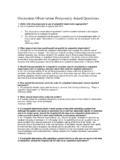Transcription of HOSPITAL OUTPATIENT CLINICS – LEGAL …
1 HOSPITAL OUTPATIENT CLINICS LEGAL considerations . impacting PHYSICIANS. 2010 CALIFORNIA PHYSICIAN'S LEGAL HANDBOOK. VOLUME 5, CHAPTER 35, PAGE 4. BY ANTHONY HUNTER SCHIFF, , California hospitals have begun to operate OUTPATIENT CLINICS as a vehicle through which to recruit new physicians or to retain existing physicians, thus helping to develop, expand or preserve key medical programs. In certain settings, hospitals utilize these CLINICS as a pathway to help insure coverage of a service, including both primary care and surgical services. For example, several hospitals have created orthopedic OUTPATIENT CLINICS using this model.
2 These CLINICS do not require separate licensure; they are exempt because they operate as OUTPATIENT departments of the hospitals. This article focuses on key issues that present from the operation of these OUTPATIENT CLINICS . LEGAL AUTHORITY FOR HOSPITAL OUTPATIENT CLINICS . OUTPATIENT departments of a HOSPITAL are exempt from clinic licensure laws pursuant to Health & Safety Code 1206(d). The broad language of the statute does not specify or limit the type of OUTPATIENT departments that a HOSPITAL may operate under their general acute care licenses. Health & Safety Code 1206(d) provides: (d) CLINICS conducted, operated, or maintained as OUTPATIENT departments of hospitals.
3 Importantly, the statute does not exempt hospitals or physicians from the corporate practice of medicine prohibition (see Business & Professions Code 2400). Thus, hospitals may not employ physicians to staff the CLINICS , retain their professional fees, or otherwise exercise dominion or control over the manner in which professional services are rendered. For more information, see CMA ON- CALL document #0280, "Corporate Practice of Medicine Bar." Nor does the law exempt physicians from the anti-rebate and kickback laws (see Business & Professions Code 650).
4 For more information, see CMA ON-CALL document #0620, "Prohibitions Against Kickbacks and Fee-Splitting.". ATTRACTION OF OUTPATIENT clinic . Physicians are primarily attracted to the OUTPATIENT clinic model as a means to reduce their practice overhead significantly. In the typical private practice setting, physicians are responsible for providing (and paying for) office space, equipment, furniture and furnishings, supplies, personnel, billing and collection, and administrative support (collectively, the Facilities ). Under the OUTPATIENT clinic model, the HOSPITAL provides the majority of these overhead items.
5 The physicians remain responsible to provide professional liability insurance, and billing and collection services. In larger practices, the physicians need to provide a reduced management and administrative infrastructure, too. BILLING AND THE POTENTIAL FOR FALSE CLAIMS. For each patient encounter in the OUTPATIENT setting, the HOSPITAL seeks to recover the cost of providing the Facilities by submitting a separate bill to the applicable third party payer. Correspondingly, the attending physician (or his or her group practice) submits a bill to the same payer with a location modifier to denote that the patient encounter occurred in an OUTPATIENT facility.
6 In theory, the HOSPITAL should receive reimbursement from the payer for the cost of the Facilities. In turn, the physician should receive a reduced fee from the payer for his or her professional services in recognition of the California Medical Association 2009. payment to the HOSPITAL for the Facilities. And, in theory, the savings to the physician from not having to provide (and pay for) the Facilities should be greater than the aggregate reduction in fees occasioned by the application of the location modifier in billing for professional services. Unfortunately, theory sometimes conflicts with practice when the HOSPITAL and physician submit bills to commercial payers.
7 This issue also presents when physicians receive global surgical fees that include reimbursement for post-operative visits in the OUTPATIENT clinic setting. The Medicare program recognizes the billing dichotomy in the clinic setting. The Medicare program will reimburse the HOSPITAL in respect of the Facilities furnished for each patient visit. Likewise, the Medicare program will reimburse the physician for professional services at a lower rate in recognition of the location modifier. However, a physician submits a false claim when failing to include the location modifier in the bill.
8 (42 1320a-7b(a)(1).) The lack of the location modifier implies that the physician furnished the Facilities when, in fact, the HOSPITAL furnished such items in connection with the patient encounter. By excluding the location modifier, the physician is requesting payment for goods and services not actually furnished to the Medicare beneficiary, the very essence of a false claim. Surprisingly, the majority of commercial payers are either unable or unwilling to separately reimburse both the HOSPITAL and the physician for patient encounters in the clinic setting.
9 Instead, these commercial payers typically reimburse the physician as if the patient encounter occurred in the private practice setting, even when the physician includes the location modifier on the bill. As a result, the physician receives a global fee from the commercial payer that includes reimbursement for the HOSPITAL -supplied Facilities. Similarly, a surgeon will receive a global surgical fee both from the Medicare program and commercial payers. That fee will include reimbursement for post-operative visits. Under the OUTPATIENT clinic model, those visits will occur in the OUTPATIENT clinic setting in which the physician will utilize the Facilities.
10 However, the facility fee received by the HOSPITAL in connection with the surgery (inpatient or OUTPATIENT ) will not include reimbursement for the Facilities supplied by the HOSPITAL in connection with post-operative visits in the clinic setting. Importantly, the physician should not retain either the entire clinic -encounter global fee or surgical global fee, even if the HOSPITAL permits the physician to do so. Instead, the physician should utilize a portion of the global fee to reimburse the HOSPITAL for the Facilities. The failure of the physician to reimburse the HOSPITAL and/or the unwillingness of the HOSPITAL to accept reimbursement from the physician for the Facilities could be construed as consideration paid by the HOSPITAL to the physician in exchange of patient referrals, a violation of federal and state anti-kickback laws.







